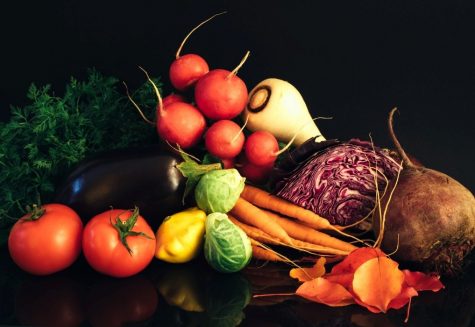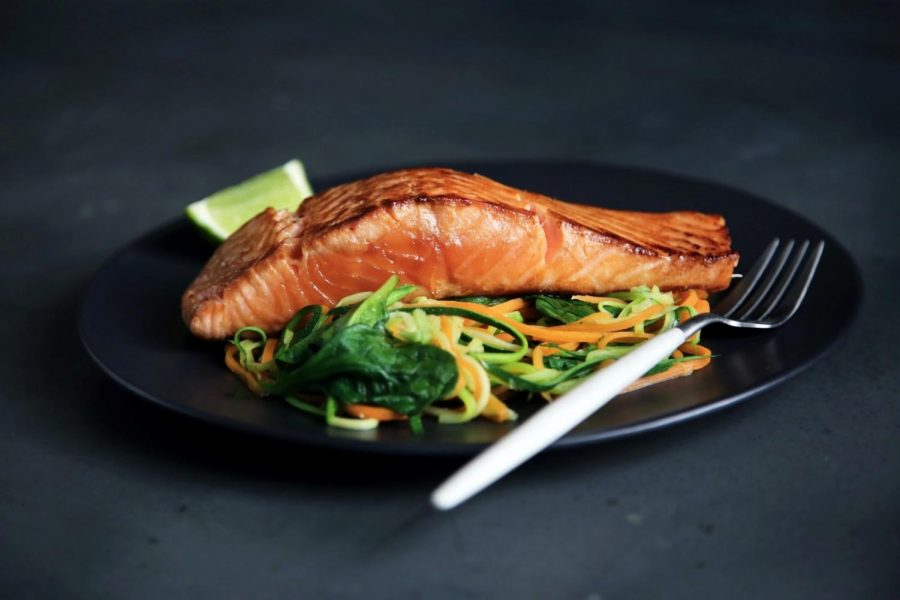The Rebellious Vegetarians: Pescatarians and Their Lifestyle
As I rip the breast meat off of the rotisserie chicken, I think to myself, “There’s gotta be another way.” Ladies and gentlemen, there is another way. Meet vegetarians with a twist. Pescatarians refrain from eating red meat and poultry but compensate by eating seafood and fish. Some pescatarians even eat dairy and eggs. Someone may choose to become a pescatarian due to environmental, ethical, and/or health concerns.
Let’s Save the Environment
Many people turn towards pescetarianism in hopes of being sustainable. The process of raising livestock is deadly for Mother Earth, and here’s why. “I would consider being pescatarian because I could easily stop eating chicken, pork, beef, etc.; however, since I am from Maryland I do love eating crabs and other seafood…” [/pullquote]According to Healthline’s article, What is a Pescatarian and What Do They Eat, “…raising livestock contributes to 15percent of all human-made carbon emissions…” Healthline also says: “…A 2014 study calculated that diets of fish eaters caused 46% less greenhouse gas emissions than the diets of people who ate at least a serving of meat a day…” Not only are you helping minimize greenhouse gases, but you’re not contributing to the deforestation rate due to agriculture and grazing. What’s stopping you from decreasing your carbon footprint?
Think About Charlotte’s Web
Okay, so you may not care about the environmental benefits, but how about for the animal’s sake? Many people are familiar with the famous children’s book and movie, Charlotte’s Web. It is the story of a piglet rescued from death by a little girl and who became friends with a spider in the barn where he lived. I know I get emotional thinking about that book. If the idea of innocent cows, pigs, sheep, and chickens being slaughtered makes you uncomfortable, making the switch to eating seafood and fish alone might be right up your alley. If you’re worried about the fish being in pain, I have some good news. According to Medical News Today’s article, What is a Pescatarian diet? “…A 2015 study concluded that although fish can experience psychological stress, they lack the neural network necessary to experience pain…” When asked why one might become a pescatarian, one student* said, “Honestly I don’t know if I could do vegetarian cause like the proteins we need to eat and stuff, but I would do pescatarian because livestock is definitely over slaughtered…” Another student, who asked to remain anonymous, replied, “I would consider being pescatarian because I could easily stop eating chicken, pork, beef, etc.; however, since I am from Maryland I do love eating crabs and other seafood…”
Cheers to Your Health
Along with helping save the environment and animals, pescetarianism includes many health benefits. Keep your heart happy! Fish consumption decreases blood pressure, lowers heart rate, reduces the risk of heart attacks and strokes. Fatty fish such as salmon provide omega-3, which are vital to maintaining a healthy lifestyle. Omega-3 fatty acids may relieve depression, improve attention in ADHD, relieve aspects of dementia, schizophrenia, and bipolar disorder, as well as Alzheimer’s disease. Omega-3 also reduces symptoms in autoimmune diseases such as lupus and rheumatoid arthritis due to their anti-inflammatory properties. The majority of the pescatarian diet is plant-based. Healthline points out some positive benefits: “According to one 2017 analysis, people who have a diet high in vegetables and other plant foods have a reduced risk of coronary heart disease…” Kick potential cancer out of your life! Pescatarians are less susceptible to colorectal cancers. Afraid of getting diabetes and inflammations? Fear no more! Pescatarians are at a lower risk of type 2 diabetes, and the omega 3’s in fatty fish help prevent inflammation. See, removing red meat and poultry out of your life doesn’t sound that horrible.
Although the motive for becoming pescatarian or vegetarian ( hey, let’s not count them out) is commonly due to one of the three categories expressed above, some people have different reasons. In an interview with current GC junior, Sophia Pipta ‘22, she excitedly said, “I am now vegetarian. Solely in defiance to my meat-loving parents. It is my one testimony against them, showing my true independence and freedom to choose to do as I wish…” Another student, who asked to remain anonymous, explained, “I’d probably not consider it because I like my burgers. Even if I wanted to, I would not have the willpower to get rid of meat completely.” As a former burger lover, I can tell you that over time you will no longer crave burgers unless they are veggie-based.

Before introducing a new diet to your regiment, you should always consult with your doctor to make sure that the change will not adversely affect your health. To further educate yourself on the health pros and cons of a pescatarian diet, read What is a Pescatarian Diet? in the 2018 edition of Medical News Today.
Once you are fully informed and have checked with your doctor, I challenge you to try this diet for a week, or even a day!
VIVA EL PEZ!
Sources:
“Wild Salmon .” SuperFoods: Fourteen Foods That Will Change Your Life, by Steven Pratt et al., Transworld Digital, London, 2004, pp. 138–139. Accessed 17 October 2020.
Crichton-Stuart, Cathleen. “Pescatarian Diet: Pros, Cons, and What to Eat.” Edited by Katherine Marengo, Medical News Today, MediLexicon International, 6 Dec. 2018, www.medicalnewstoday.com/articles/323907. Accessed 17 October 2020.
Jennings, Kerri-Ann. “What Is a Pescatarian and What Do They Eat?” Healthline, Healthline Media, 10 Mar. 2017, www.healthline.com/nutrition/pescatarian-diet. Accessed 17 October 2020.
Davies , Matt. “Pescatarian Diet.” The Environmental Impact, www.mossy.earth/guides/diet/pescatarian-diet. Accessed 17 October 2020.

